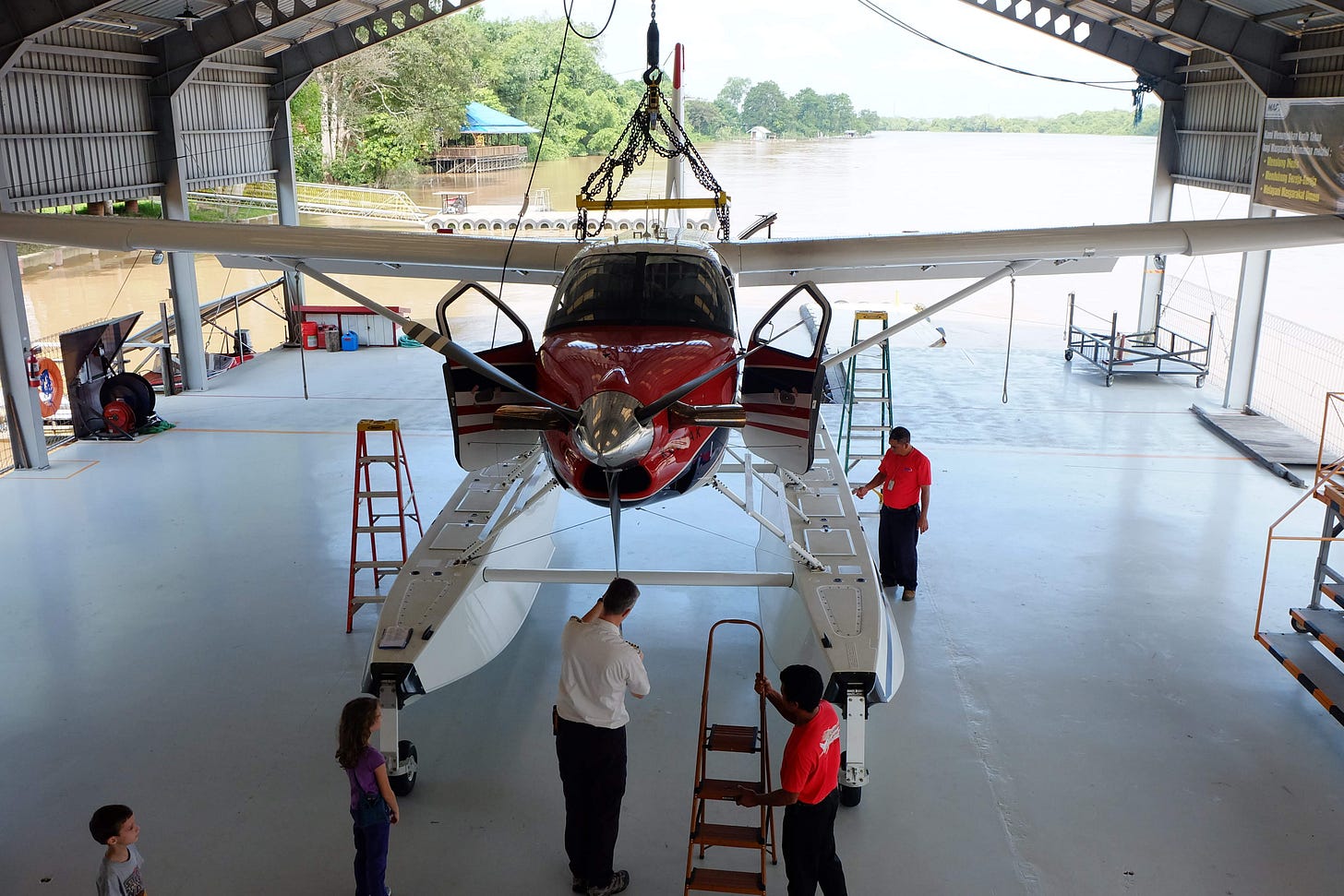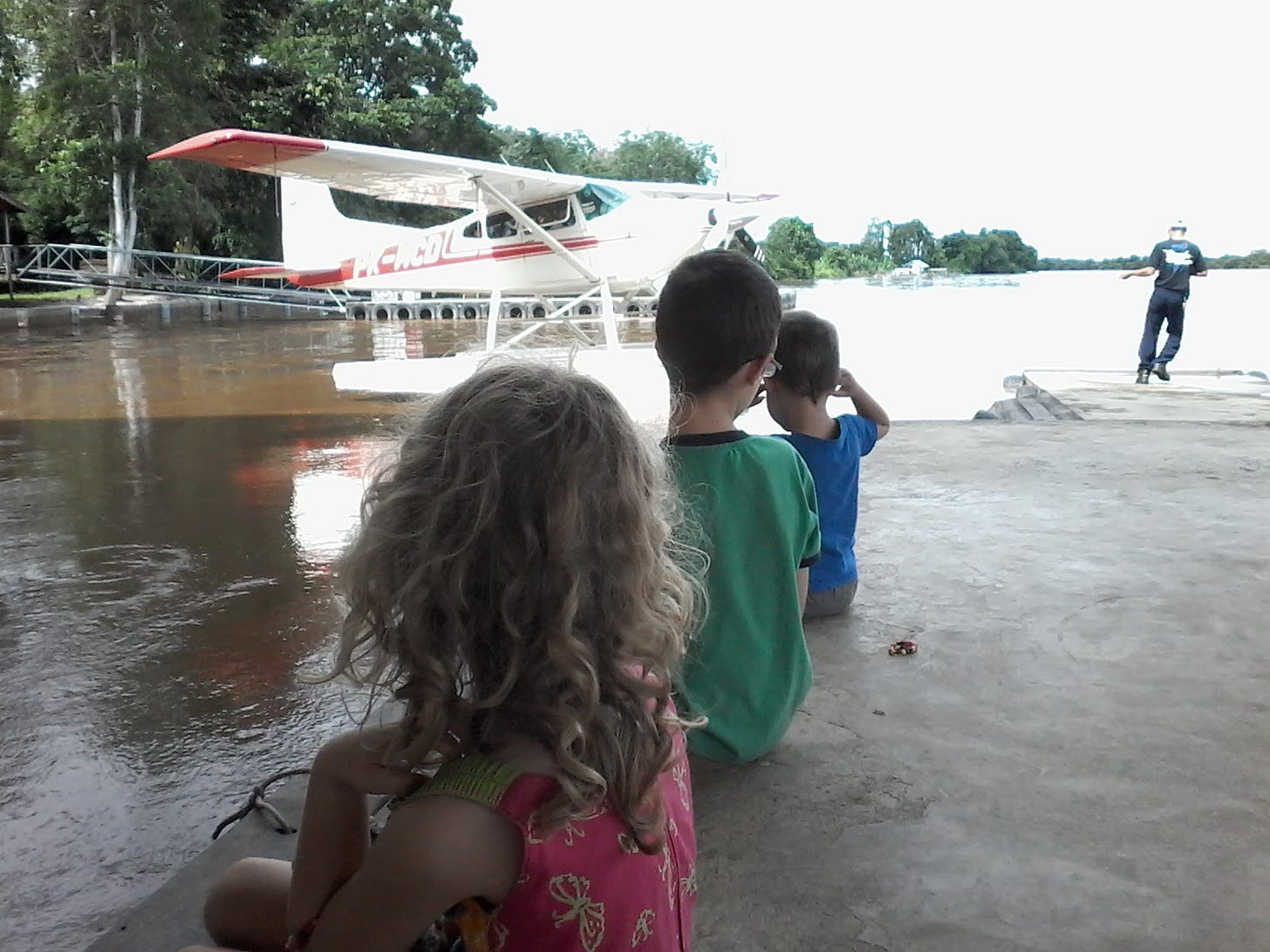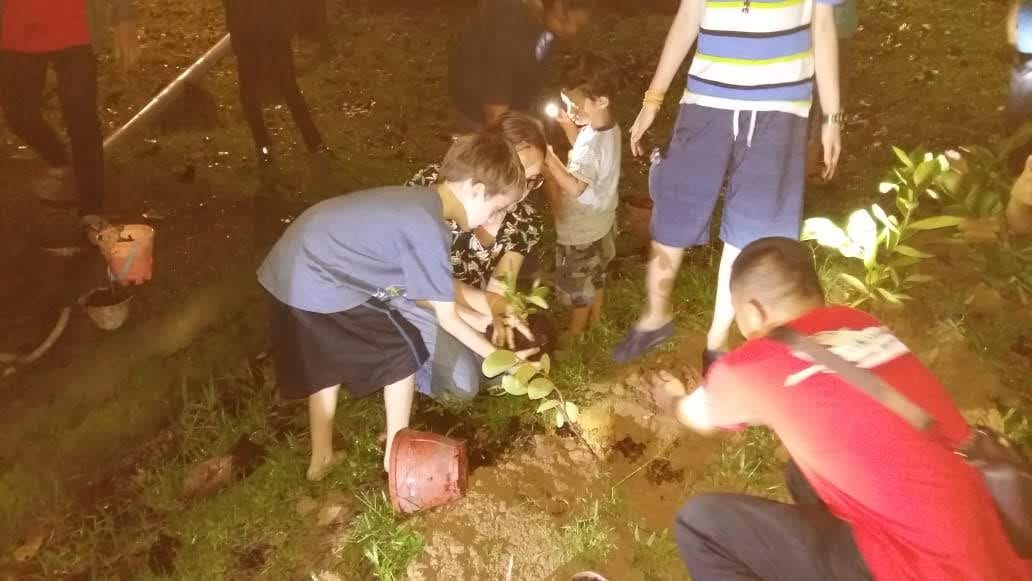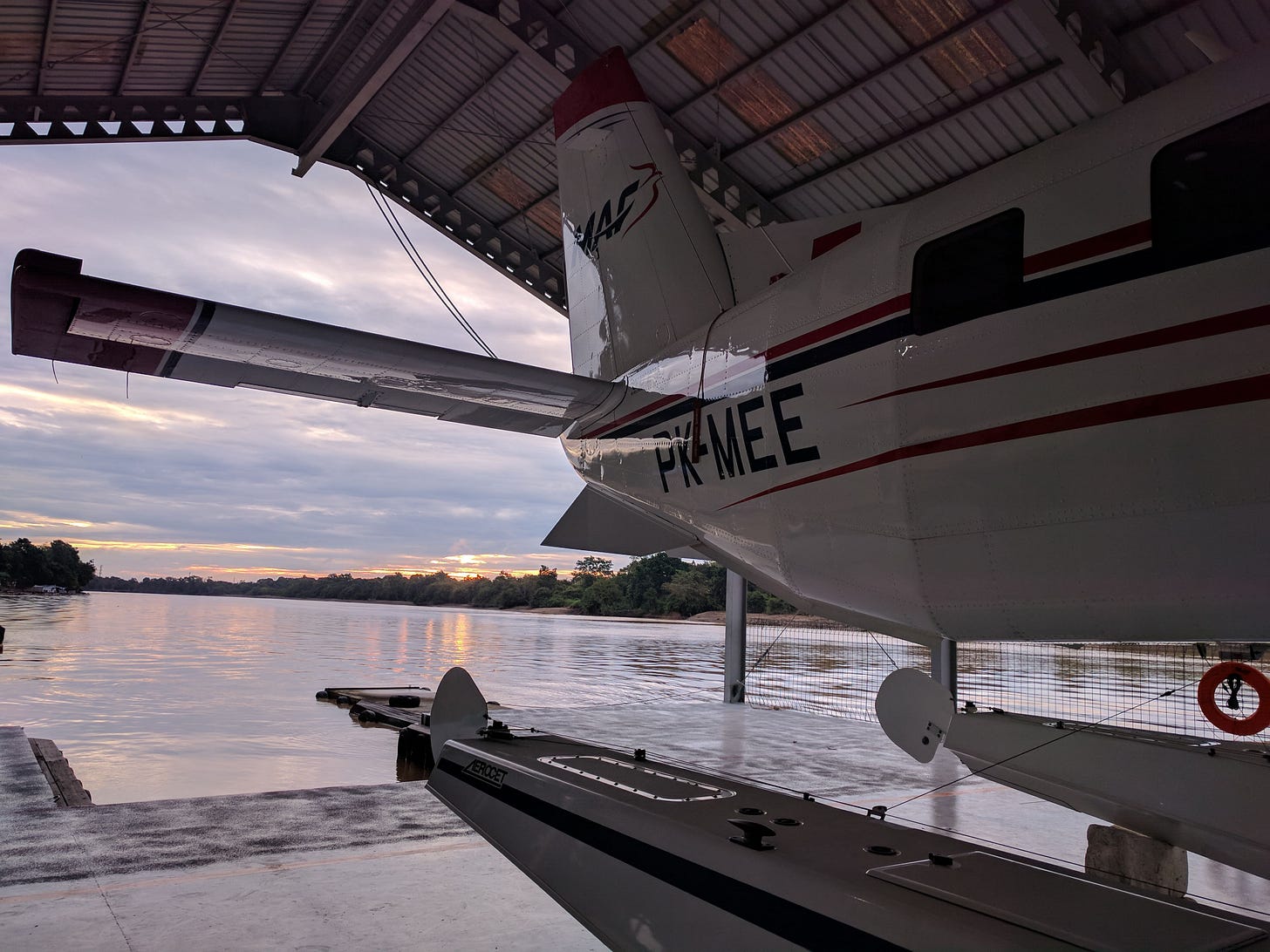
Somehow the book, “Necessary Endings” made its way across the ocean to our island home in Indonesia just when I needed it.
Excited to read a fresh new book in English, I borrowed Henry Cloud’s book from another missionary who maybe got it from who knows which visitor from the United States who tucked in into their suitcase.
The book cautions against loyalty in the face of mistreatment. It warns about false hope that simply more time will bring important changes. And it advises that a necessary ending could set us free.1
I read it in 2016 when I had absolutely no intention to end my time serving with Mission Aviation Fellowship (MAF). I believed strongly in MAF’s mission to serve remote communities around the world. MAF’s small airplanes can land on sides of mountains or winding jungle rivers to carry food, medicine, Bibles, and isolated passengers. I also connected deeply to our Indonesian community who had become like family.
An appropriate title for my missionary mindset was “Necessary Endurance.” Despite experiencing several traumas and feeling trapped in a confusingly tense dynamic with a particular manager, I was fighting to stay.
However, some of the ideas of the book stayed with me over the next three years as we entered a painful season of whistleblowing within MAF.
“(A)re there situations in business or in life where you are trying to birth things that should be dying?” Cloud wrote. “Laughing at something you should be weeping about? Embracing something (or someone) you should shun? Searching for an answer for something when it is time to give up?”2
I wrote in my last two substack posts about how in the midst of my husband’s and my attempts to respectfully report aviation safety concerns, leadership issues, and a disturbing relationship with MAF’s team pastors, MAF forced us to leave our place of ministry. They blamed my husband’s lack of “submission” to our managers as the reason. In one particularly confusing moment of testing our loyalty to our leaders, our manager accused us of loving our Indonesian community “too much.”
Whistleblowers are usually loyal employees or members who are trying to speak up for the sake of the organization and for the safety and care of others.3 But unfortunately, rather than seeking important feedback, employers sometimes decide the whistleblowers are the problem. That means that some of you have been unjustly fired. Others have been so marginalized and isolated that you decided (or are in the process of deciding right now) to resign.
Either way, endings and unexpected goodbyes are a life-altering part of the whistleblower journey. Whistleblowers experience “good” byes that release you from toxicity and bad byes that are so destructive that you need years and likely counseling to heal from them. The best byes, however, are the ones that transform you, opening the door to a healthier, more meaningful future.
The “good” byes of whistleblowing
If there’s one thing my nomadic childhood taught me, it’s how to move. I grew up as an Army kid, moving from state to state, starting over every six months to three years. I proudly learned how to be comfortable being uncomfortable, turn strangers into best friends, and sacrifice stability for the greater purpose of freedom for the United States.
But one of my proudest moments in the weeks leading up to our unexpected departure from MAF happened in a Zoom meeting with MAF’s head of member care when I took a different tactic. The member care director said it was against the Gospel to use MAF’s whistleblower policy. In response, I told her I wasn’t comfortable with retaliation. I reported inappropriate behavior by a leader we thought was also our close friend. And I stood firm in advocating for the needs of both our family and our community. I found my voice. I used it. And though I didn’t think she listened well, I ended the call glad I’d spoken my mind.
But the next morning, I woke up and had my first ever panic attack. In standing up for myself, I wondered, had I made an enemy of the person who was in charge of our family’s care while we lived in a remote, high-risk part of the world?
Despite my Army kid dedication, many times in our 14 years living in Indonesia, I wondered if I could keep going. Could I get through another day of energy-sapping tropical heat, long power outages, culture shock, taking care of young kids with no family nearby, and seemingly insurmountable needs all around me?
In the days following that Zoom call, the principles from “Necessary Endings” nagged at me. Now it wasn’t a matter of “could I?” Rather, should I keep fighting to stay in an organization that was treating us this way?
Since my husband was the only pilot serving a remote region of hundreds of miles with medevac service and other important resources, we didn’t feel like we had a choice. We believed we shouldn’t abandon a community we loved and who loved our family so well, too by quitting. So, we took the steps that were in our power to promote reconciliation. And we prayed, desperately, for healthy change.
But then our boss chose for us. He removed us from our home, ministry, and positions.
“I feel like God rescued us,” my husband, Brad, told me at the time.
When we got on the plane to leave Indonesia, I was relieved that my husband no longer was risking his life for an organization that didn’t care well for him. I was glad I was leaving a situation that didn’t honor whistleblowers’ rights to seek protection. I knew I didn’t want to keep sacrificing for leaders who were trying to silence us. In that sense, I knew this goodbye was good for us.
But still, drowning in losses, I didn’t feel then that I was living a rescue. I turned to Brad and said, “I feel like we’ve been exiled.”
The bad byes of whistleblowing
Scientists have found that the experience of being ostracized triggers the same parts of our brain that physical pain triggers.4 From my own experience and from interviews with other whistleblowers, I’ve seen that the hardest part of departures due to whistleblowing is the rejection by those once close to us.
In their book, “Third Culture Kids,” authors Dave Pollock and Ruth Van Reken offered four important steps to help missionary families transition well to new locations. Before they leave, missionary families can build a RAFT.
Reconciliation
Affirmation
Farewell
Think destination

But the tools we would normally use to build our RAFT—our connections to our team, our voice, our agency to choose a healthy path forward—were taken from us in our departure from MAF.
Research shows that most whistleblowers suffer from mental health concerns like depression and severe anxiety at the same prevalence as people who survived a recent major disaster. Whistleblowers often experience retaliation, financial stresses, legal worries, relationship strain, and the stressful impact on their family, the researchers noted. And more than 60 percent of whistleblowers reported “very negative” effects on their relationships with their former colleagues, the same study shows. 5
To experience rejection by their support system on top of all that can be devastating.
To add to that, many whistleblowers have shared with me the confusing impact whistleblowing has had on our understanding of themselves and the world. The world as you know it has turned upside down.
Our regional manager (now an MAF vice president) told us in a legally recorded Zoom meeting something that particularly haunted me. He was pressuring us to go through MAF’s counseling to figure out why husband Brad wasn’t “submissive” enough to his MAF leaders. But this leader went a step further. He said if Brad didn't comply with MAF’s counseling plan and instead decided to leave MAF, then Brad would be “hampered” in his next job.
It’s possible a manager could give that kind of advice to encourage growth. But I knew how hard my husband had worked to try to exceed his boss’s expectations for 14 years. I had watched Brad study and learn almost every day to become a better pilot and leader. I’d seen Brad respectfully, humbly, and gently address important safety, leadership, and possible abuse concerns. And yet, Brad’s requests still weren’t “humble” enough for our leaders who chastised Brad in emails and Zoom meetings. Brad’s bravery in speaking up—at the cost of his missionary pilot dream—is what’s most right with Brad. Brad’s commitment to excellence and health doesn’t “hamper” safety but rather is an asset to his current position as an airline pilot flying hundreds of passengers.
In that very bad bye, our family could've used a RAFT. Instead our leader’s shaming parting words stuck in my mind for years like a curse.
The best byes of whistleblowing
A few days before we had to leave Indonesia, we gathered with a few close friends and mostly Indonesian co-workers at the MAF hangar at the floating base in Palangkaraya for an Indonesian “perpisahan,” or going away party.
The hangar is one of a kind—a floating dock propped up with high-grade Styrofoam and Dutch engineering. Its design is strong enough to hold a 7,000-pound plane from a hoist, but flexible enough to rise and fall with Borneo’s ever-changing Kahayan River.

In our four years at this unique float plane base, our small team held prayer meetings there. We’d gathered with friends for sunset picnics. The kids and I would welcome patients on Brad’s incoming medevac flights. And on hot afternoons, we’d swing out on ropes tied to the roof to jump, screaming with excitement, into the river.

But the plane Brad flew would soon be gone, never to return—in only a matter of days. Since MAF had made no plan to send another pilot to this base, they were ending the work there and moving the plane to another base.
That evening, friends arrived, embracing us with two-cheeked kisses and warm smiles. Pak Abet was there. A couple years previous, he had given blood to save my son Eric’s life. Esther came with her mom, Mama Eki. She was my kids’ first—and last—friend here, an almost daily presence of calm in our lives. Ibu Agnes walked toward me for a hug. She was my pastor’s wife but served as my primary minister of both grace and truth to me in dark moments. She also gave me a Kalimantan gold ring I still wear almost every day.
My dear friend, Laura, stepped out of her car, carrying bags with leaves sticking out the top. She’s British-raised, but now an Indonesian citizen, a scientist and a mum, and a brilliant model on how to bridge cultures and values.
I smiled and said, “You found them.”6
A couple days before, I asked her where I could buy tumih trees. I had an idea.
Laura had recently taken my family on a hike through a tree rehabilitation farm. Scientists were working to reforest the vast damage caused by the country’s worst fire and burn season. We’d walked on paths to the edge of where the fire had decimated all life. I’d learned then that it doesn’t work to just plant a bunch of random trees to replenish a jungle after a fire. You have to be intentional.
Pioneer trees could be one choice to begin replanting the forest. They’re a category of species named for their hardiness, their ability to grow up tall first before the symbiosis of other trees provides the community trees need to thrive. But the downside is, they can end up dominating the space and nutrients, taking over, pushing out other growth and the richness that diversity provides.
Nurse trees could be another consideration to restart a forest. They share resources and nurture other species. But unfortunately, they’re not independent and strong enough to forge their way through charred ruins.
Indonesian tumih trees, however, are a rare combination of both nurse and pioneer. They’re strong and resilient, but also caring and sharing. They both pave a way forward, but also make space for others. They’re the type of tree that could redeem all that has been lost from this land.
In the midst of years of trauma, I had almost lost my faith. The first question that then rolled into many more was this. Had our family risked our lives for a toxic colonial endeavor? Though I’d seen many positive results of sacrificial missionary work, I’d also heard of and then experienced firsthand how my religion, once clothed in Jesus’ sacrificial burial rags, had grabbed power for itself.
Was there such a thing as healthy Christianity that used its power well? Could Christians help others without also hurting them?
The tumih tree, both powerful and nurturing, showed me how. Yet again, Indonesia changed the way I saw the world.
In 1996, psychologists Richard Tedeschi and Lawrence Calhoun coined “post-traumatic growth” to explain how the perceptions, philosophies, and relationships of trauma survivors often change for the better after traumatic events.7
“Recognizing meaning in the midst of trauma and its aftermath may allow a person to experience emotional relief and lead to a new philosophy of life that alters basic assumptions people hold about life and what meaning it may have,” the researchers wrote.8
For our going away party, Laura had helped find small tumih seedlings that Brad and I planned to give as parting gifts to our team that night.
I started to pull out my remaining Indonesian cash.
“How much do I owe you?” I asked her.
Laura shook her head.
“I’m not taking your money,” she said. “I’m giving them to you and to your team.”
Yes, of course. We could all plant them together, side by side, after dinner.

“This is the best gift I’ve ever given,” Laura said.
I hadn’t wanted this ending, desperately didn’t want this story, wished I could wake up and forget this entire last year.
But this moment? The sun setting, the sky aglow beyond the jungle. The smell of the food spicy and rich and layered. Birds and monkeys rustling in branches above us. The murmur of friends’ voices around me. The river, its constant force in front of us, connecting village after village through this adopted home of mine. I took it all in greedily. I concentrated, committing it to memory.
I reached out my hand to touch the tumih leaves. Though both our family and the plane would be gone soon, I pictured these small trees rooting here among friends, growing tall and strong and generous.
This ending was also beginning something important for me. It was planting in me a new philosophy of doing work, ministry, and life that still dreams big, but also honors ethics, marginalized voices, and care for my family.
I felt speechless with the power and grace of the moment. But I managed to say, “And this is the best gift I’ve ever received.”
Henry Cloud, “Necessary Endings: The Employees, Business, and Relationships That All of Us Have to Give Up in Order to Move Forward,” 2011.
Ibid.
A 2011 survey by the Ethics Resource Center found that 76 percent of people who blew the whistle externally (outside their company) did so to prevent harm to others. In contrast, for the instances in which whistleblowers could get monetary awards for such a step, money was the least likely motivator.
Naomi J. Eisenberger, et. al., “Does Rejection Hurt? An fMRI Study of Social Exclusion,” Science, 2003.
Peter G. van der Velden, Mauro Pecoraro, Mijke S. Houwerzijl, and Erik van der Meulen, “Mental Health Problems Among Whistleblowers: A Comparative Study,” Psychological Reports, 2019.
The conversation between Laura and me is from my memory and from a journal entry I wrote that night after I got home from the going away party. The words may not be exact.
Richard G. Tedeschi and Lawrence G. Calhoun, “The Posttraumatic Growth Inventory: Measuring the Positive Legacy of Trauma,” Journal of Traumatic Stress,1996.
Ibid.





Oh my! It's been 25 months since a ministry trauma hit my husband & I, and we have been at a stand still ever since. Everytime I feel I can move beyond the betrayal, something else happens. Your articulate, informative and encouraging words help tremendously! I also now see possible "timeh trees" in Henry Cloud's book that may assist my husband & I with tools to find our new direction and place in G-d's kingdom. Bless you!
This is lovely, Rebecca. Strong and healthy post-trauma growth, yes!